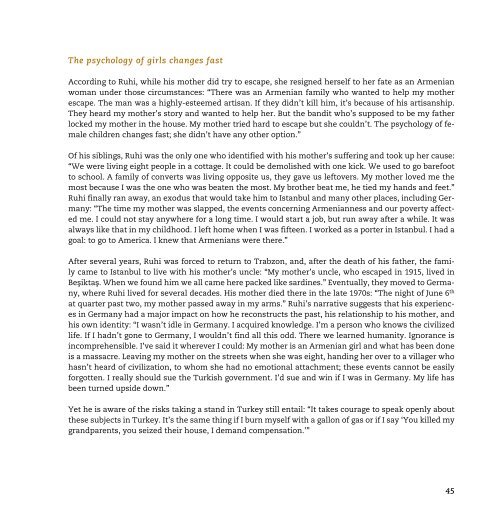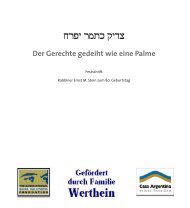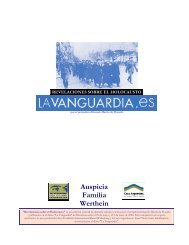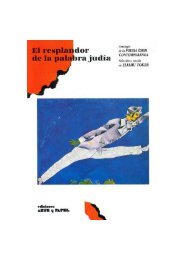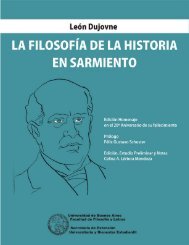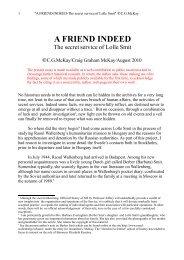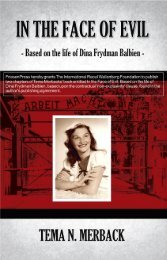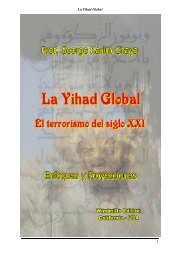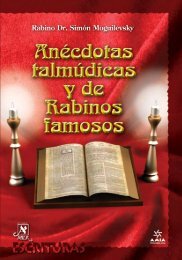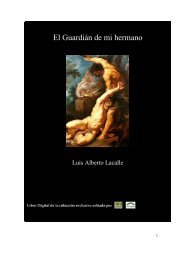Speaking to One Another - The International Raoul Wallenberg ...
Speaking to One Another - The International Raoul Wallenberg ...
Speaking to One Another - The International Raoul Wallenberg ...
- No tags were found...
Create successful ePaper yourself
Turn your PDF publications into a flip-book with our unique Google optimized e-Paper software.
<strong>The</strong> psychology of girls changes fastAccording <strong>to</strong> Ruhi, while his mother did try <strong>to</strong> escape, she resigned herself <strong>to</strong> her fate as an Armenianwoman under those circumstances: “<strong>The</strong>re was an Armenian family who wanted <strong>to</strong> help my motherescape. <strong>The</strong> man was a highly-esteemed artisan. If they didn’t kill him, it’s because of his artisanship.<strong>The</strong>y heard my mother’s s<strong>to</strong>ry and wanted <strong>to</strong> help her. But the bandit who’s supposed <strong>to</strong> be my fatherlocked my mother in the house. My mother tried hard <strong>to</strong> escape but she couldn’t. <strong>The</strong> psychology of femalechildren changes fast; she didn’t have any other option.”Of his siblings, Ruhi was the only one who identified with his mother’s suffering and <strong>to</strong>ok up her cause:“We were living eight people in a cottage. It could be demolished with one kick. We used <strong>to</strong> go barefoot<strong>to</strong> school. A family of converts was living opposite us, they gave us lef<strong>to</strong>vers. My mother loved me themost because I was the one who was beaten the most. My brother beat me, he tied my hands and feet.”Ruhi finally ran away, an exodus that would take him <strong>to</strong> Istanbul and many other places, including Germany:“<strong>The</strong> time my mother was slapped, the events concerning Armenianness and our poverty affectedme. I could not stay anywhere for a long time. I would start a job, but run away after a while. It wasalways like that in my childhood. I left home when I was fifteen. I worked as a porter in Istanbul. I had agoal: <strong>to</strong> go <strong>to</strong> America. I knew that Armenians were there.”After several years, Ruhi was forced <strong>to</strong> return <strong>to</strong> Trabzon, and, after the death of his father, the familycame <strong>to</strong> Istanbul <strong>to</strong> live with his mother’s uncle: “My mother’s uncle, who escaped in 1915, lived inBeşiktaş. When we found him we all came here packed like sardines.” Eventually, they moved <strong>to</strong> Germany,where Ruhi lived for several decades. His mother died there in the late 1970s: “<strong>The</strong> night of June 6 that quarter past two, my mother passed away in my arms.” Ruhi’s narrative suggests that his experiencesin Germany had a major impact on how he reconstructs the past, his relationship <strong>to</strong> his mother, andhis own identity: “I wasn’t idle in Germany. I acquired knowledge. I’m a person who knows the civilizedlife. If I hadn’t gone <strong>to</strong> Germany, I wouldn’t find all this odd. <strong>The</strong>re we learned humanity. Ignorance isincomprehensible. I’ve said it wherever I could: My mother is an Armenian girl and what has been doneis a massacre. Leaving my mother on the streets when she was eight, handing her over <strong>to</strong> a villager whohasn’t heard of civilization, <strong>to</strong> whom she had no emotional attachment; these events cannot be easilyforgotten. I really should sue the Turkish government. I’d sue and win if I was in Germany. My life hasbeen turned upside down.”Yet he is aware of the risks taking a stand in Turkey still entail: “It takes courage <strong>to</strong> speak openly aboutthese subjects in Turkey. It’s the same thing if I burn myself with a gallon of gas or if I say ‘You killed mygrandparents, you seized their house, I demand compensation.’”45


